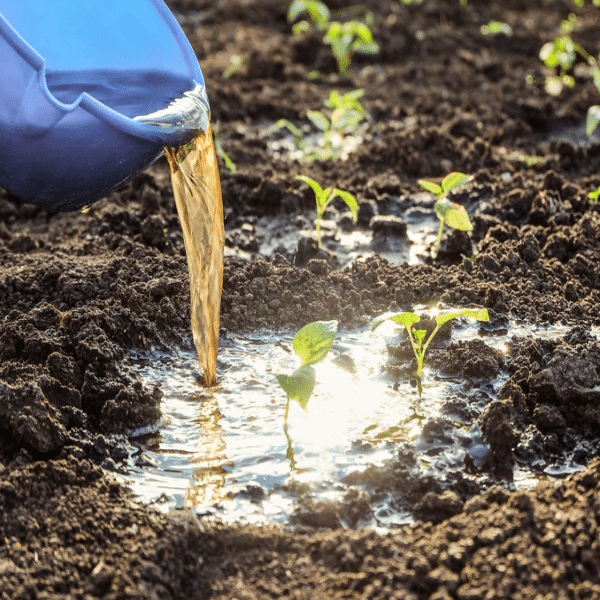Introduction to Organic Liquid Nitrogen Fertilizer
Organic liquid nitrogen fertilizer has become an integral part of modern organic agriculture due to its opportunities to provide plants with nutrients in a more sustainable and efficient way. It is very natural in its existence since its main sources of origin can be a waste product of any livestock, leguminous cover crop or even composted organic residue. After its processing, it becomes a liquid form easier to use and absorbed by plants.
Nitrogen (N) is a macronutrient — a chemical element required in relatively large amounts to support plant growth and development. Nitrogen is an integral part of chlorophyll, the green coloured compound responsible for both plants’ green pigmentation and their life-giving process of photosynthesis. Plants require an adequate supply of nitrogen to produce lush, vigorous growth and, if nitrogen availability is limited, plants may respond by slowing their growth rate and producing leaves that are not as green or healthy looking.
Soil ecologist and organic farming expert Dr Emily Carter explains: ‘Using organic liquid nitrogen fertilizers adds to the overall vitality of the soils ecology. Unlike synthetics, they do not cause nutrient runoff or degrade the soils.’ Having established the general principle, the rest of the paragraph can now go into further detail about exactly how and why organic liquid nitrogen fertilizers promote healthy, strong plant growth, in the most environmentally friendly way possible.
Benefits of Using Organic Liquid Nitrogen Fertilizer
Organic liquid nitrogen fertilising can also be very beneficial to a garden or field of plants. That is because it lets the plant grow really well while keeping a balance of ecology to the environment.
Fast absorption and action: possibly the most apparent benefit to liquid nitrogen fertilizers compared with granular or solid forms of nitrogen application is the rapidity with which they are all rapidly absorbed and actioned by plant roots. The liquid form is such that deficiencies caused by plants that have not captured enough nitrogen from the atmosphere can be rapidly and efficiently updated by these fertilizers to give the plant immediate vigour and a boost in foliage colour. This is absolutely vital for horticulture and vegetable crops in their earlier growth stages when they are particularly sensitive to any nitrogen deficiencies.
Environmental Impact: Organic liquid nitrogen fertilizers are derived from natural sources, and are usually processed with half the number of chemicals when compared to their synthetic counterparts. This means that they have a lower environmental impact, giving rise to half the biocide and chemical runoff and pollution. Using organic fertilizers reduces the amount of synthetic chemicals introduced into ecosystems, which are known to cause eutrophication of nearby water bodies and soil degradation. Moreover, since organic options are highly biodegradable, they are typically beneficial to the soil microbiome and aid in creating a better soil structure and fertility level over time.
What’s more, they help to maintain the normal pH of the soil, and prevent salt accumulation that can damage soil health, a common side-effect of synthetic fertilizers. ‘Organic liquid nitrogen fertilizer is not only a growth enhancer that improves the grain yield and the quality of our crops, it also supports an overall healthier and more sustainable agricultural production system,’ says Hannah Reynolds, an environmental agronomist. She notes that synthetics remove natural fertility from the soil system, while organic fertilizers support a deeper natural cycling of nutrients.
‘The organic fertilizer increases soil organic matter and also stimulates beneficial soil biology that works to improve root growth, which helps the plants to produce more biomass. This in turn contributes to greater growth at the top and increased nutrient and water use efficiency.’
In so doing, gardeners and farmers can enjoy two of the best features of organic liquid nitrogen: fast ‘spike’ effects in plants and long-term improvement of soil health, all part of sustainable agricultural and environmental stewardship.

How to Apply Organic Liquid Nitrogen Fertilizer
Proper application of organic liquid nitrogen fertilizer is essential to harness its benefits effectively. Here’s a detailed guide on using this type of fertilizer for various plant types.
Application Techniques:
- Preparation: It’s crucial to pre-water the area to ensure the soil is moist but not waterlogged, especially when using a concentrated formula. Applying too much concentrate too quickly on dry soil can cause root burn.
- Method:
- Liquid Form: Whether it’s fish emulsion or another processed organic liquid, always dilute the fertilizer according to the directions on the product label. Apply the diluted mixture to the soil around the base of the plants, not directly on the foliage, to avoid leaf burn. The added water helps distribute and absorb the nutrients more effectively through the soil, reaching the plants’ roots.
- Using a Sprayer or Watering Can: For even distribution, use a sprayer or watering can to apply the liquid fertilizer across the plant’s root area.
Dosage and Timing:
- Dosages: Follow the manufacturer’s recommendations on dosage, adjusting for the plant’s size and type. Excess fertilizer that plants cannot absorb may run off and pollute the environment or harm the plants.
- Timing: Apply fertilizers early in the morning or late in the evening to minimize evaporation and maximize absorption. During the growing season, applications every four to six weeks are ideal. Reduce the frequency during dormant periods or according to the specific needs of your plants.
Frequency and Amount:
- Regular Feeding: Regular application every 4-6 weeks can significantly enhance plant growth. Adjust the frequency based on plant responses and seasonal growth variations: more frequent during peak growth periods and less so during slower growth phases.
- Monitoring Plant Responses: Observing your plants’ health is the best indicator of effective fertilization. Healthy plants should exhibit vibrant, rich green foliage. Signs of over-fertilization include yellowing or stunted growth; if these occur, reduce the frequency and amount of fertilizer.
Following these guidelines ensures that organic liquid nitrogen fertilizer promotes rapid plant growth and maintains a healthy garden. Proper usage helps avoid environmental contamination and plant toxicity, ensuring only the beneficial nutrients reach your plants at the right times.
The Advantages of Using Organic Liquid Nitrogen Fertilizer for Indoor Plants
Organic liquid nitrogen fertilizers help to soothe and nurture indoor plants during both day and night, and there are numerous benefits derived from its application.This is because the introduction of liquid nitrogen fertilizers enhances the growth of indoor plants, and also the environment where they thrive. Below are some of the advantages.
Better Plant Health And Growth From Organic Fertilizer: The main reason why organic liquid nitrogen fertilizer is very popular is that nitrogen is a key nutrient in the synthesis of proteins and other compounds that are important for plant growth. By applying this type of organic fertilizer, we are providing a readily available form of nitrogen that plants can quickly use. Often, plants can take in this nitrogen through their roots. This means that the plants receive a quick boost in nutrient intake and experience rapid growth and luscious foliage. We deliver the organic liquid nitrogen fertilizer directly on ground which means that it is immediately accessible by plant roots.
Better Soil Microbiome: fertilizers infused with organic liquid nitrogen improve soil health while synthetic fertilizers often do the opposite. Natural fertilizers are much less aggressive than synthetic fertilizers and do not kill the soil’s beneficial bacteria and allow the soil to breathe optimally; instead, they enhance microbial soil life, allowing for more robust plant growth, and increased nutrient-holding capacity that reduces frequency of watering and fertilising.
Environmental benefits: Amid these arguments about the fate of plant nutrients, there is an environmental benefit to opting for organic over synthetic nitrogen fertilizers: organics are derived from natural materials, and so decay naturally in the environment without leaving a chemical residue, and keep the number of chemicals entering waterways and the atmosphere down instead. When gardeners buy organics, they sustain a sustainable ecology – one that supports not only the plants but the ecosystem around them, including the fauna.
Long-term cost efficiency: If organic liquid nitrogen fertilizers are costlier than some synthetic alternatives, their respective efficiencies and benefits to soil health mean that they could, in time, become cheaper. Plants and soils in good health need less tinkering, meaning less need for additional products and other measures to maintain it. This could mean that organic fertilizers offer greater cost-efficiency further down the line.
Organic liquid nitrogen fertilizer for healthy plant growth, favourable environmental impacts and safer, more effective indoor gardening is now just one click away.
Troubleshooting Common Issues with Organic Liquid Nitrogen Fertilizers
Understanding potential problems and their solutions can significantly enhance the effectiveness of using organic liquid nitrogen fertilizers. Here are some common issues and how to address them:
Over-Fertilization and Its Consequences:
- Symptoms: Over-fertilization can lead to leaf scorch, where leaf tips turn brown and crispy, or stunted growth due to nutrient overload.
- Solution: Always adhere to the recommended application rates on the product label. If over-fertilization symptoms occur, reduce the frequency and amount of fertilizer application. Water the plants deeply to help leach excess nitrogen from the soil, mitigating potential damage.
Under-Fertilization and Nutrient Deficiency:
- Symptoms: Insufficient nitrogen can cause pale or yellow leaves and halted growth, as nitrogen is crucial for chlorophyll and energy (ATP) production in plants.
- Solution: If signs of nitrogen deficiency are apparent, slightly increase the frequency of fertilization or adjust the concentration of the nitrogen mix. Ensure that the fertilizer is adequately absorbed by the plant roots.
Dealing with Environmental Factors:
- Problem: Environmental conditions like temperature and humidity can impact nitrogen uptake. High temperatures may accelerate nitrogen absorption, potentially leading to symptoms of over-fertilization, while low temperatures can slow it down.
- Management: Monitor plant health and adjust fertilization based on environmental conditions. Use lower concentrations of fertilizer during hotter periods to prevent burn, and ensure the soil is warm enough before applying fertilizer in cooler climates.
Improper Mixing and Application:
- Problem: Incorrectly mixed fertilizer or uneven application can lead to patchy growth, with some areas potentially experiencing toxicity while others may be nutrient-deficient.
- Correction: Mix the fertilizer thoroughly as per the manufacturer’s instructions and apply it evenly around the soil using a watering can or fertilizer sprayer to ensure uniform distribution.
By being aware of these issues and implementing these solutions, you can improve the success rate of applying organic liquid nitrogen fertilizers, promoting healthier plant growth and maintaining environmental balance. Regular monitoring and adjustment of fertilization practices are essential to maintain optimal plant health.

Conclusion: Enhancing Plant Health with High Phosphorus Organic Fertilizer
The strategic use of high phosphorus organic fertilizer is essential for promoting optimal plant growth, particularly by enhancing root development and floral production. Proper application of this type of fertilizer ensures that plants not only grow healthier and more beautiful but also contribute to more productive gardens or farms.
Summary of Key Points:
- Crucial Role of Phosphorus: Phosphorus is vital for helping plants develop long and strong root systems and produce vibrant floral blooms, significantly contributing to the overall health and vigor of a plant.
- Organic Benefits: The text discusses the environmental and plant health advantages of using organic sources of phosphorus over synthetic ones. Emphasis is placed on sustainability and minimizing environmental damage.
Final Thoughts:
- High-P Organic Fertilizers: Increasingly recommended for propagators and organic farmers, high phosphorus organic fertilizers offer numerous benefits, including ecological advantages and enhanced plant growth by promoting the acceptance of mycorrhizal symbionts and other soil organisms.
- Recommended Trials: It is advised to conduct trials using various rates of application to determine optimal conditions for using high-P organic fertilizers. This involves testing application rates and methods suitable for different types of plants and soil conditions.
By adopting organically based practices, you ensure not only the well-being of your plants but also the broader ecosystem, supporting sustainable land practices that benefit both horticulture and the planet’s health.
FAQs: Common Questions About High Phosphorus Organic Fertilizer
Q1: How often should I use high phosphorus organic fertilizer on my plants?
A1: Ans: How often (in Latin, quo) should fertilizer containing higher permanently active components (phosphorus) be applied? It depends on personal circumstances and needs of your plants. If you use high phosphorous fertilizer, it should be applied every 4-6 weeks during vegetative period and breathing period, and it should be reduced during the period of quiescence.
Q2: Can high phosphorus organic fertilizer harm my plants?
A2: High phosphorus fertilizers are safe and beneficial when used correctly. Overuse of phosphorus can contribute to nutrient burn, and cause other problems such as nutrient imbalances. Always follow recommended application rates.
Q3: Does high phosphorus organic fertilizer have more benefits for some plants rather than others?
A3: Phosphorus fertilizer in particular is a great choice for heavy feeders — plants such as tomatoes, peppers and flowering plants that benefit from high levels of phosphorus that stimulate strong, healthy root and vibrant flowering growth.
Q4: Do high phosphorus organic fertilizers work as quickly as synthetic ones?
A4: Nutrients in organic fertilizers are often released much more slowly than in the synthetic kind. In proper use, that slow release can enhance consistent long-term growth, although more patchy growth may be possible initially if your plant is short on nutrients.
Q5: How do I know if my soil needs high phosphorus fertilizer?
A5. Signatures that your soil might be phosphorus deficient: poor plant growth, thin roots, absence of colourful blooms and fruits Perform a soil test and you’ll know if your soil might be phosphorus deficient.
Q6: Is high phosphorus organic fertilizer better for the environment?
A6: It is more environmentally friendly to use organic fertilizers vs synthetic ones. They get their nutrients from natural sources, avoid chemical runoff, and promote a healthier ecosystem in your garden and out.
Here are some references on organic liquid nitrogen fertilizer:
- Washington State University (WSU) – Discusses the relationship between soil organic matter, microbial nitrogen needs, and the impact of nitrogen fertilizers on microbial biomass and soil carbon. The findings indicate that synthetic nitrogen can increase microbial biomass and both decomposable and persistent forms of soil organic carbon.
- Geisseler and Scow (2014) – This review explores the long-term effects of mineral fertilizers on soil microorganisms, providing insights into how different fertilization strategies impact soil health.
- Chen et al. (2018) – This research investigates the role of nitrogen in controlling soil carbon storage by examining enzyme activities and soil carbon measurements across multiple studies, highlighting the nuanced impacts of nitrogen additions on soil health.







